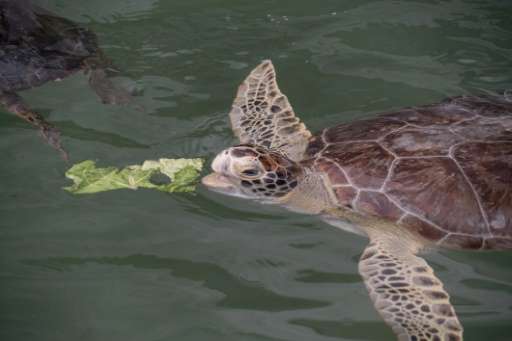A green sea turtle at the Turtle Hospital in Marathon, Florida on January 14, 2016
Green sea turtles of Florida and the Pacific coast of Mexico are no longer considered "endangered," US officials said Tuesday, hailing decades of conservation for saving the long-imperiled creatures.
Breeding populations on the beaches of Florida and the west coast of Mexico are now considered "threatened," and still merit protection under the Endangered Species Act, but do not face an imminent risk of extinction.
In Florida alone, there are some 2,250 nesting females counted on beaches each year, up from a handful in 1978 when the breeding populations were first listed as endangered, a spokesman for the US Fish and Wildlife Service said.
As part of the change, the US FWS and the National Oceanic and Atmospheric Administration (NOAA) Fisheries divided green sea turtles globally into 11 distinct population segments, "allowing for tailored conservation approaches for each population," the agencies said in a statement.
That leaves three populations of green sea turtles worldwide that are considered endangered and at the highest risk of disappearing from the planet—those that live in the Mediterranean Sea as well as the Central South Pacific and Central West Pacific Ocean.
Most of the world's populations of green sea turtles are listed as "threatened."
The changes were initially proposed last year and made final on Tuesday after officials reviewed the scientific data and an outpouring of more than 900 public comments.
"Successful conservation and management efforts developed in Florida and along the Pacific coast of Mexico are a roadmap for further recovery strategies of green turtle populations around the world," said Eileen Sobeck, assistant NOAA administrator for fisheries.
Sea turtles have long faced a host of threats, from beach development that destroyed their nesting habitat, to pollution, to fishing nets that entangled them.
Successful measures have included protection of nesting beaches, reduction of bycatch in fisheries and prohibitions on the direct harvest of sea turtles, NOAA said.
© 2016 AFP























